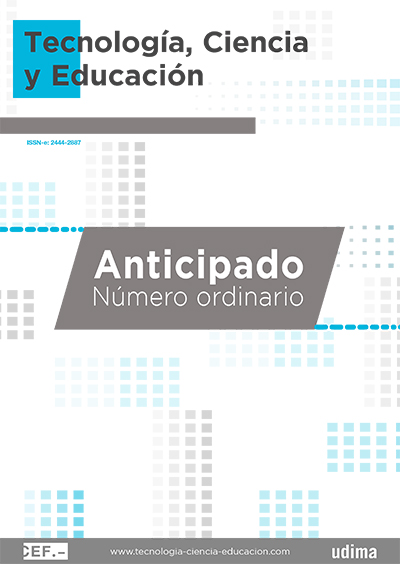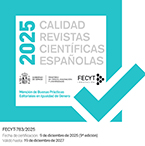Use of virtual lab of industrial automation and its relationship with learning attitudes in engineering students
DOI:
https://doi.org/10.51302/tce.2025.24325Keywords:
higher education, quality of education, virtual laboratory, automation, student attitude, learning, simulationAbstract
Currently, we live in a highly competitive environment in all aspects of life, particularly in higher education. Therefore, engineering students (men and women) must prepare to face the challenges of an increasingly globalized world, making it essential to promote educational quality in higher education institutions, which is currently aligned with goal 4 of the sustainable development goals promoted by the United Nations (UN). The objective of this study was to determine the relationship between the use of a virtual industrial automation laboratory and the attitude towards learning among mechatronics engineering students at the Instituto Tecnológico de Los Mochis. The software used for programming was LabVIEW, while Factory I/O was utilized to virtually recreate industrial processes and plant simulation. Regarding the methodology, the study followed a quantitative approach. Data collection involved a purposive sample of 34 students enrolled in the Process Control course. These students participated in a practical activity using both a traditional physical laboratory and a virtual automation laboratory. The design employed was an experimental group with pretest and posttest measurements. The study was designed as an experimental group with a pre-test and post-test, and data were collected using a Likert-scale instrument. The results indicate a positive impact and a statistically significant increase in the «confidence and security» dimension, as well as a positive increase in the dimensions of «autonomy in learning», «perception of usefulness», and «individual and team work». However, there was a statistically non-significant decrease in the «interest and motivation» dimension.
Downloads
References
Akinola, V. O. y Oladejo, A. I. (2020). Virtual laboratory. A viable and sustainable alternative to traditional physical laboratory. Journal of Educational Research and Development, 15(2), 13-29.
Ambusaidi, A., Al Musawi, A., Al Balushi, S. y Al-Balushi, K. (2018). The impact of virtual lab learning experiences on 9th grade students' achievement and their attitudes towards science and learning by virtual lab. Journal of Turkish Science Education, 15(2), 13-29. https://doi.org/10.36681/
Betancourt Ramos, P. A., Alzate, L. A. y Ardila Suarez, J. D. (2023). Efectos de laboratorios virtuales en competencias procedimentales de ciencias naturales de estudiantes de octavo grado. EDUWEB, 17(4), 55-64. https://doi.org/10.46502/issn.1856-7576/2023.17.04.6
Borjas, H. y Borjas, W. (2019). Laboratorio virtual en entorno de programación Labview para adiestramiento en el área de automatización de la Universidad Alonso de Ojeda. Revista Electrónica de Estudios Telemáticos, 18(2), 19-39.
Calvo, I., Zulueta, E., Gangoiti, U. y López, J. M. (2008). Laboratorios remotos y virtuales en enseñanzas técnicas y científicas. Ikastorratza, e-Revista de Didáctica, 3, 1-21.
Campos Mera, G. y Benarroch Benarroch, A. (2024). Laboratorios virtuales para la enseñanza de las ciencias: una revisión sistemática. Enseñanza de las Ciencias, 42(2), 109-129. https://doi.org/10.5565/rev/ensciencias.6040
Colmenares, J. E., Héndez, N. R. y Celis-Giraldo, J. (2018). Percepciones de los estudiantes sobre el uso de los laboratorios virtuales en mecánica de suelos. Revista Educación en Ingeniería, 13(25), 88-101. https://doi.org/10.26507/rei.v13n25.880
Dancey, C. P. y Reidy, J. (2007). Statistics without Maths for Psychology. Pearson Education.
Díaz Barriga Arceo, F. y Hernández Rojas, G. (2010). Estrategias docentes para un aprendizaje significativo (3.ª ed.). McGraw-Hill.
García Moreno, E. (2020). Automatización de procesos industriales: robótica y automática. Editorial Universitat Politècnica de València.
Geels, F. W. (2020). Micro-foundations of the multi-level perspective on socio-technical transitions: developing a multi-dimensional model of agency through crossovers between social constructivism, evolutionary economics and neo institutional theory. Technological Forecasting and Social Change, 152. https://www.sciencedirect.com/science/article/pii/S0040162518316111
Gurría, A., Schleicher, A. y Organización para la Cooperación y el Desarrollo Económicos (OCDE). (2019). El trabajo de la OCDE sobre educación y competencias. Dirección de Educación y Competencias, OCDE. https://www.cna.gov.co/1779/articles-401134_documento.pdf
Heradio, R., Torre, L. de la, Galan, D., Cabrerizo, F. J., Herrera-Viedma, E. y Dormido, S. (2015). Virtual and remote labs in education: a bibliometric analysis. Computers & Education, 98, 14-38. https://doi.org/10.1016/j.compedu.2016.03.010
Hernández-Sampieri, R. y Mendoza Torres, C. P. (2018). Metodología de la investigación: las rutas cuantitativa, cualitativa y mixta. McGraw Hill Education.
Hurtado Chong, G., Garza Vázquez, A. y Bautista Blanco. (2023). Experiencias con el uso de laboratorios virtuales para mejorar el aprendizaje. Memorias del XXIX Congreso Internacional Anual de la SOMIM, 20 al 22 de septiembre, Ciudad Juárez, Chihuahua, México. https://somim.org.mx/memorias/memorias2023/articulos/M56-A5_67.pdf
Jaime Torres, M. G. e Ibarra Padilla, R. C. (2024). Uso de laboratorios virtuales para la enseñanza de la ciencia, nivel secundaria. Revista Electrónica Desafíos Educativos-REDECI, 7, 73-82. https://revista.ciinsev.com/assets/pdf/revistas/REVISTA15/6.pdf
Jonassen, D. y Rorher-Murphy, L. (1999). Activity theory as a framework for designing constructivist learning environments. Educational Technology Research and Development, 47, 61-79. https://doi.org/10.1007/BF02299477
Martínez-Alvarez, N. y Martínez-López, L. (2024). Sinergia Piaget, Vygotsky y la inteligencia artificial en la educación universitaria. VinculaTégica EFAN, 10(4), 70-84. https://doi.org/10.29105/vtga10.4-948
Mayer, R. E. (2014). Introduction to multimedia learning. En R. E. Mayer (Ed.), The Cambridge Handbook of Multimedia Learning (2.ª ed.). Cambridge University Press. https://doi.org/10.1017/CBO9781139547369
Michelena Grandío, Á. M., Casteleiro Roca, J. L., Jove Pérez, E., Zayas Gato, F., Quintián Pardo, H. y Calvo Rolle, J. L. (2022). Creación de laboratorios virtuales para asignaturas de control con Factory I/O® y Simulink®. https://doi.org/10.17979/spudc.9788497498371
Oviedo, H. C. y Campos Arias, A. (2005). Aproximación al uso del coeficiente alfa de Cronbach. Revista Colombiana de Psiquiatría, 34(4), 572-580. http://www.scielo.org.co/pdf/rcp/v34n4/v34n4a09.pdf
Piñeres Retamoza, R. J. (2022). Efectos del laboratorio virtual en la motivación y el desempeño de los estudiantes. Gaceta de Pedagogía, 42(núm. extraordinario), 107-128. https://doi.org/10.56219/rgp.vi42.510
Rosli, R. e Ishak, N. A. (2024). Integration of virtual labs in science education: a systematic literature review. Jurnal Pendidikan Sains Dan Matematik Malaysia, 14(1), 81-103. https://doi.org/10.37134/jpsmm.vol14.1.8.2024
Sánchez Sánchez, R. (2019). El pensamiento de Vygotsky y su influencia en la educación. Latin-American Journal of Physics Education, 13(4), 1-3.
Sapriati, A., Suhandoko, A. D. J., Yundayani, A., Karim, R. A., Kusmawan, U., Adnan, A. H. M. y Suhandoko, A. A. (2023). The effect of virtual laboratories on improving students´ SRL: an umbrella systematic review. Education Sciences, 13(3), 1-13. https://doi.org/10.3390/educsci13030222
Singhai, R. (2019). Virtual lab: a powerful learning tool in science. International Journal of Recent Trends in Science and Technology, núm. especial, 51-58.
Solikhin, F., Sugiyarto, K. H. e Ikhsan, J. (2022). Using virtual laboratory: a profile of students´ self-efficacy on electrochemistry. Acta Chimica Asiana, 5(1), 193-201. https://doi.org/10.29303/aca.v5i1.116
Torres, A., Jara, C. A., Pomares, J., García, G. J., Ramón, J. L., Úbeda, A. y Díaz, C. S. (2021). Desarrollo de laboratorios híbridos de sistemas industriales para el aprendizaje interactivo de automatización y control. XL Jornadas de Educación Automática (pp. 354-359), del 4 al 6 de septiembre, Ferrol. https://doi.org/10.17979/spudc.9788497497169.354354
Triana Ortiz, K. N., Herrera Muñoz, D. C. y Mesa Mendoza, W. N. (2020). Importancia de los laboratorios remotos y virtuales en la educación superior. Documentos de Trabajo ECBTI, 1(1). https://doi.org/10.22490/ECBTI.3976
UNESCO. (2000). Informe de la reunión de expertos sobre laboratorios virtuales. Instituto Internacional de Física Teórica y Aplicada.
Yildirim, F. S. (2021). The effect of virtual laboratory applications on 8th grade students´ achievement in science lesson. Journal of Education in Science Environment and Health, 7(2), 171-181. https://doi.org/10.21891/jeseh.837243
Zaldívar Colado, A. (2019). Laboratorios reales versus laboratorios virtuales en las carreras de ciencias de la computación. IE Revista de Investigación Educativa de la Rediech, 10(18), 9-22. https://doi.org/10.33010/ie_rie_rediech.v10i18.454
Downloads
Published
Versions
- 2025-09-05 (2)
- 2025-07-22 (1)
How to Cite
Issue
Section
License
Copyright (c) 2025 Salvador Acosta Haro

This work is licensed under a Creative Commons Attribution-NonCommercial-NoDerivatives 4.0 International License.


























